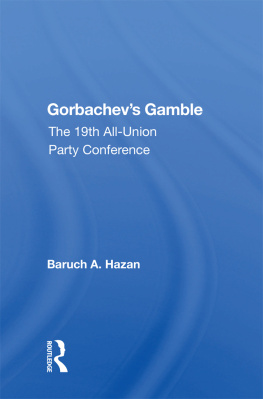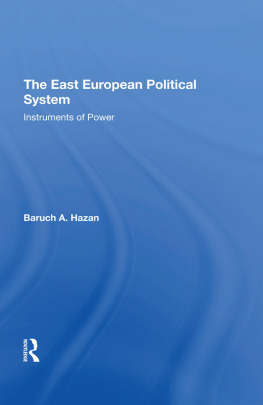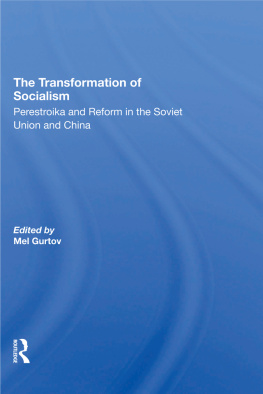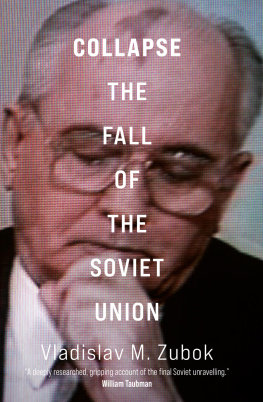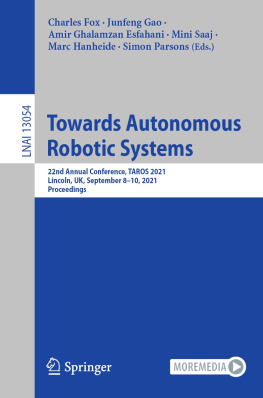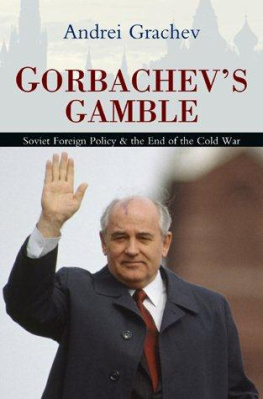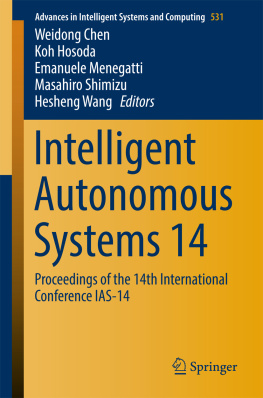Gorbachev's Gamble
The 19th All-Union Party Conference
Baruch A. Hazan
First published 1990 by Westview Press, Inc.
Published 2018 by Routledge
52 Vanderbilt Avenue, New York, NY 10017
2 Park Square, Milton Park, Abingdon, Oxon OX14 4RN
Routledge is an imprint of the Taylor & Francis Group, an informa business
Copyright 1990 Taylor & Francis
All rights reserved. No part of this book may be reprinted or reproduced or utilised in any form or by any electronic, mechanical, or other means, now known or hereafter invented, including photocopying and recording, or in any information storage or retrieval system, without permission in writing from the publishers.
Notice:
Product or corporate names may be trademarks or registered trademarks, and are used only for identification and explanation without intent to infringe.
Library of Congress Cataloging-in-Publication Data
Hazan, Baruch, 1942
Gorbachev's gamble: the 19th All-Union Party Conference / Baruch
A. Hazan.
p. cm.(Westview special studies on the Soviet Union and
Eastern Europe)
ISBN 0-8133-7779-X
1. Kommunisticheskaia partiia Sovetskogo Soiuza. Vseoiuznaia
konferentsiia (19th: 1988: Moscow, R.S.F.S.R.) 2. Soviet Union
Politics and government1985- Congresses. I. Title.
II. Series.
JN6598.K5 1990
324.247'075dc20 89-35020
CIP
ISBN 13: 978-0-367-01320-2 (hbk)
To Iris
on her graduation
Contents
, Baruch A. Hazan
Guide
Every new book on Gorbachev or events related to perestroika in the Soviet Union involves a great risk. Events in the USSR have been developing with such a speed since Gorbachev assumed power that almost any book or article on recent Soviet politics becomes obsolete by the time it is published. Things that only a few months ago, let alone a few years ago, seemed to be revolutionary or even impossible are now normal facts of life in the USSR. Indeed, forecasting the future of events in Moscow has become a difficult and highly speculative exercise. Although most Sovietologists agree that the process of perestroika is irreversible and that even the removal of Gorbachev will not stop it, hardly anyone would risk an opinion on Gorbachev's personal fortunes.
Against this background, a book on a historical event such as the 19th All-Union CPSU Conference rests on safer ground. After all, the conference, despite its overwhelming impact on Soviet political life, is already history; but this does not mean that its importance has diminished. First, the conference played an important role in the power struggle between the opponents and proponents of perestroika . Second, it represented an important landmark along the road to perestroika in the Soviet Union. Finally, it provided Gorbachev with a test bed for (relatively) competitive elections, free debates, (partly) live television coverage of official party proceedings, and open criticism of the party leadership, all of which have since become regular features of USSR political life under perestroika . Consequently, it appears that whatever the future developments are in the Soviet political scene, the 19th Ail-Union CPSU Conference is assured of a special place in any study of Soviet politics.
The idea for this book, as so often in the past, came from Frederick Praeger. I am grateful for the idea and his friendly support.
I am greatly indebted to John and Karin for always providing the right piece of material at the right time; to Bob for his numerous suggestions related to the final version of the manuscript and to Marion for typing it; and to Michelle Starika of Westview Press for doing such a great editorial job.
Finally, and as always, I could never write this book without the support of the "home team"Helen, Ramona, Iris, and Dorley. To them, and to all those who contributed ideas and suggestions, I am deeply grateful. I only wish I could share the credit for my mistakes with them. Unfortunately, they are all mine.
B. Hazan
Vienna
1
Prelude to the Conference: The Reluctant Acceptance
Frustrated by the slow pace of reform and unable either to combat the opposition within the party, especially in the Central Committee and the party apparatus, or to transform his economic and political reforms from mere words into tangible results, Mikhail Gorbachev decided at the beginning of 1987 to revive a long-forgotten party forumthe All-Union Party Conference. Traceable {like so many of Gorbachevs ideas) to Lenin, the party conference was once an extraordinary party forum that convened in the intervals between regular party congresses to address pressing economic and political issues that could not be delayed until the next regular congress. Perhaps because the conference was conceived as an instrument that the top leadership could employ during unexpected or unusual situations, the Communist Party of the Soviet Union (CPSU) Statute provides no precise definition of the functions of the conference, nor does it lay down any rules of procedure or list its powers. In fact, all these matters are left to the discretion of the CPSU Central Committee. The only sentence in the CPSU Statute that mentions the All-Union Party Conference reads: "Between party congresses the Central Committee of the CPSU may, if necessary, convene a country-wide party conference to discuss pressing matters of party policy. The procedure for holding the party conference is determined by the CPSU Central Committee.
With the strengthening of Stalin's dictatorship, the practice of convening all-party conferences was discontinued, evidently because Stalin found them unnecessary. The last such forumthe 18th All-Union Party Conferencewas held in February 1941 and rather than dealing with any party affairs served purely as a propaganda form to rally the party and country for the fight against the impending German invasion.
Paradoxically, although the original idea of the all-party conference, as incorporated in the CPSU Statute, was that it should serve as a party instrument to promote the implementation of party policy, Gorbachev's intention was, apparently, to use it as an instrument for boosting his reforms by overcoming the deeply entrenched opposition within the party and by replacing Central Committee members and other high-ranking party officials who regarded perestroika simply as a threat to their positions and privileges. Thus, Gorbachev's proposal to convene the conference constituted an admission that the party had itself become a formidable obstacle to Gorbachev said:
I would like in this connection to take counsel on such a fundamental issue: possibly, it is advisable to convene an all-union party conference next year on the eve of the report-and-election campaign within the party, and extensively to review the course of implementation of the decisions of the 27th Congress of the CPSU and to sum up the first half of the five-year plan period. It would be also right for the conference to discuss questions of further democratising the life of the party and society as a whole.
The discussion started at this conference could be continued at report-and-election party meetings and conferences, at which the results of the restructuring work of each party organization should be analyzed in an exacting way.
The very fact of convening an all-union party conference in accordance with the CPSU's rules would become a serious step in democratising in practice our party life and developing Communists' activity.


